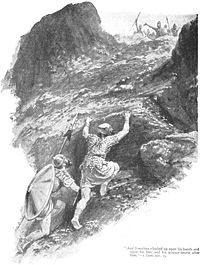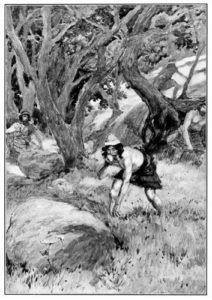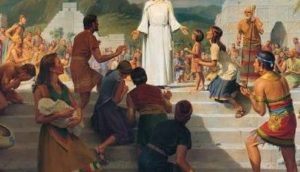OLD TESTAMENT READING 1 SAMUEL 13:23-14:52
 Saul’s son, Jonathan, demonstrates courage and faith. He is not intimidated by the size of the enemy’s army nor the obstacles of cliffs. All he needs is a clear word from the Lord about a promised victory.
Saul’s son, Jonathan, demonstrates courage and faith. He is not intimidated by the size of the enemy’s army nor the obstacles of cliffs. All he needs is a clear word from the Lord about a promised victory.
He gives his loyal armor-bearer precise instruction. Jonathan demonstrates commendable leadership qualities. He has waited upon the Lord and inquired of Him enough to articulate a strategy: “Let the enemy see us, and if they say ‘Come up to us,’ we will climb up, because that will be our sign that the Lord has given them into our hands.”
God acts on Jonathan’s behalf. He could have sung the words that the Psalmist would write in the future found in Psalm 60:12 and Psalm 108:13 “Through God we shall do valiantly; it is He who will tread down our foes!”
In contrast, Saul walks by sight. He sees the Philistine army moving out in all directions, unaware that they are scattering due to the victory that God gave his son, Jonathan. Saul acts impulsively. He calls for the priest, Ahijah, to bring the Ark of the covenant. Whether he intended to use the Ark of God as a good luck charm or to make an honest inquiry of the Lord, we don’t know. But we do know that Saul neither receives the Ark nor makes inquiry of the Lord. He is distracted in the middle of his conversation with the priest by the increasing volume of battle sounds. He can hear the clanging of iron weapons, not knowing the cause. Hebrews who had previously joined the Philistine armies now defected and joined the Israeli side, knowing well that the Lord was responsible for giving Jonathan victory that day.
 Saul makes a foolish oath. He intends to give his army the incentive to defeat the Philistines in battle quickly, forbidding his army to eat until their victory was established. Anyone who dared to violate the king’s command would be cursed and must die (1 Sam 14:24). His son, Jonathan, does not hear the command and unwittingly eats from a honeycomb. Saul’s army has been weakened due to their lack of nourishment and were too tired to fight well. They were so hungry that when the time came to eat, they disregarded the law of God and ate meat that still contained blood.
Saul makes a foolish oath. He intends to give his army the incentive to defeat the Philistines in battle quickly, forbidding his army to eat until their victory was established. Anyone who dared to violate the king’s command would be cursed and must die (1 Sam 14:24). His son, Jonathan, does not hear the command and unwittingly eats from a honeycomb. Saul’s army has been weakened due to their lack of nourishment and were too tired to fight well. They were so hungry that when the time came to eat, they disregarded the law of God and ate meat that still contained blood.
Jonathan is not afraid to expose the faults in his father’s policies.
1 Samuel 14:29-30 29 Then Jonathan said, “My father has troubled the land. See now, how my eyes have brightened because I tasted a little of this honey. 30 “How much more, if only the people had eaten freely today of the spoil of their enemies which they found! For now, the slaughter among the Philistines has not been great.”
 Saul’s vow was a hindrance rather than a help to his people gaining victory. They fell short of defeating the enemy and sinned against the Lord by eating meat that had blood in it. Jonathan would have been killed for violating his father’s command were it not for the pleading of Jonathan’s fellow soldiers who recognized that Jonathan was the real war hero (1 Sam 14:45).
Saul’s vow was a hindrance rather than a help to his people gaining victory. They fell short of defeating the enemy and sinned against the Lord by eating meat that had blood in it. Jonathan would have been killed for violating his father’s command were it not for the pleading of Jonathan’s fellow soldiers who recognized that Jonathan was the real war hero (1 Sam 14:45).
God never demands that people make oaths, but He expects us to be people who think things through carefully and keep our word. In general, if we make a vow, we should keep it. However, the Bible does record incidents when people make foolish vows that require proper extrication (Leviticus 5:4-13).
Saul continues to assume his role as king, conscripting men into his service and waging war with the Philistines.
We are introduced to more of Saul’s family members: His wife is named Ahinoam. His son Jonathan has brothers, Ishvi and Malki-shua. His two daughters are Merab and Michal, who will one day become the first wife of King David. The commander of Saul’s army is his nephew, Abner, son of Saul’s uncle Ner.
NEW TESTAMENT READING: JOHN 7:30-53;
Jesus has gone up to Jerusalem for the Feast of Tabernacles in submission to the timetable of His Father in heaven, not his half-brothers on earth.
As Jesus predicted, the religious leaders attempt to seize him. He escapes their murderous grasp “because His time had not yet come.”
We learn of those in the crowd who put their faith in Christ. In effect, they ask, “Who could top this man in qualifying to be the Messiah?” (John 7:31)
 Jesus tells the Pharisees that He is with them for only a short time, and then He will go to the one who sent Him, referring to His post-resurrection ascension to His Father. They, being naturally minded, surmise that he is speaking of moving on to teach somewhere else, perhaps to the Greeks. They did not understand that, as God Incarnate, the time of His visitation would soon end, and He would return to His Father in heaven. The only way to find Jesus and be with Him for eternity is to believe in Him.
Jesus tells the Pharisees that He is with them for only a short time, and then He will go to the one who sent Him, referring to His post-resurrection ascension to His Father. They, being naturally minded, surmise that he is speaking of moving on to teach somewhere else, perhaps to the Greeks. They did not understand that, as God Incarnate, the time of His visitation would soon end, and He would return to His Father in heaven. The only way to find Jesus and be with Him for eternity is to believe in Him.
Each day in the week-long celebration of the Feast of Tabernacles, water in a golden vessel would be taken ceremonially from the Pool of Siloam and poured out in the temple. On the last day, the Great Day of the Feast, many scholars believe that Jesus spoke these words as the water was being poured out on the altar:
 John 7:38-39 38 “He who believes in Me, as the Scripture said, ‘From his innermost being will flow rivers of living water.'”
John 7:38-39 38 “He who believes in Me, as the Scripture said, ‘From his innermost being will flow rivers of living water.'”
John, writing later with the privilege of hindsight,
39 But this He spoke of the Spirit, whom those who believed in Him were to receive; for the Spirit was not yet given, because Jesus was not yet glorified.
Some in the crowd recognized that Jesus was “The Prophet,” the One Whom Moses foretold would be the fulfillment of all that was promised in the Law- God’s spokesperson, the absolute authority on the Law (John 7:40).
Deuteronomy 18:15 15 “The LORD your God will raise up for you a prophet like me from among you, from your countrymen, you shall listen to him.
Deuteronomy 18:18-19 18 ‘I will raise up a prophet from among their countrymen like you, and I will put My words in his mouth, and he shall speak to them all that I command him. 19 ‘It shall come about that whoever will not listen to My words which he shall speak in My name, I Myself will require it of him.
 Others recognized Him as the fulfillment of what the Prophets foretold of the Messiah (7:41). Perhaps they recognized in Jesus’ words that He was claiming to be the fulfillment of all that the Temple signified—that He would be providing the work that was necessary for sinners to be put ‘in the right’ before God, justly forgiven, cleansed, adopted, and made alive through the ministry of His Life.
Others recognized Him as the fulfillment of what the Prophets foretold of the Messiah (7:41). Perhaps they recognized in Jesus’ words that He was claiming to be the fulfillment of all that the Temple signified—that He would be providing the work that was necessary for sinners to be put ‘in the right’ before God, justly forgiven, cleansed, adopted, and made alive through the ministry of His Life.
In this scene, Jesus is claiming to be the source of the Living Water coming from the altar as prophesied in Ezekiel 47. His person, and His work on the altar of the cross, make possible the life-giving ministry of the Holy Spirit in regeneration to flow through the hearts of believers.
Some protested, thinking that He was not qualified to be the promised Son of David; they mistakenly thought that because He was called “Jesus of Nazareth,” He was from Galilee, not realizing that He was born in Bethlehem as the Messianic prophecies demanded. He was raised in Nazareth of Galilee.
The temple guards who were deployed to arrest him returned to the Pharisees empty-handed because they also were impressed by Jesus’ unique ministry:
John 7:46 46 The officers answered, “Never has a man spoken the way this man speaks.”
The Pharisees reprimand the temple guards for joining with the crowd, implying that they, the religious, academic elite, knew better than to believe that Jesus is the Messiah.
However, Nicodemus, one of the most renowned teachers in Israel, did not agree with the other Pharisees, pointing out that they were condemning Him without giving Him a fair hearing.
Once again, the Pharisees, who claimed to be the religious experts, the ‘intelligentsia’ of the day, expose both their ignorance and prejudice by saying:
“A prophet does not come out of Galilee.” (John 7:52)
In fact, five of their prophets did come from Galilee: Jonah, Nahum, Hosea, and the ‘BIG NAME PROPHETS’ -Elijah and Elisha!
They presume that they have a monopoly on the truth, and just as many were familiar with the prejudicial adage, “Can any good thing come out of Nazareth?” they imagined that the Messiah would conform to their standards rather than the criterion of Scriptures. For the Scriptures spoke of the Messiah making Galilee glorious:
Isaiah 9:1-2 1 But there will be no more gloom for her who was in anguish; in earlier times He treated the land of Zebulun and the land of Naphtali with contempt, but later on He shall make it glorious, by the way of the sea, on the other side of Jordan, Galilee of the Gentiles. 2 The people who walk in darkness Will see a great light; Those who live in a dark land, the light will shine on them.
TODAY’S READING FROM THE PSALMS
PSALMS 109:1-31
This is the Psalm written by one who calls himself ‘a man of prayer’.
When reading this Psalm, the first verses (v.1-4) make us think of the prayer life of Jesus Christ. Whoever this man is, be it King David or another, he had enemies who appeared to be pious and friendly, but were not.
Verses 6-20 make us think of Jesus’ enemies, particularly Judas Iscariot. In fact, the leaders of the early church connected verse 8 to him (Acts 1:20).
This is the last of the ‘imprecatory psalms’ that we were introduced to in Psalm 5, where the Psalmist is calling upon the Lord to uphold justice by punishing the evil-doer.
The Psalmist’s enemy appeared religious (v.7) yet hated him (v. 3,5), falsely accused him (v.2, 4), and cursed him (v.17-18).
All attempts to return good for evil failed (v.4-5). This nemesis showed no mercy but took pleasure in oppressing the needy and brokenhearted.
 The Psalmist calls upon the Lord to deal well with him for His Name’s sake. He asks Him to deliver him out of the goodness of His love and vindicate His righteous cause (v.21).
The Psalmist calls upon the Lord to deal well with him for His Name’s sake. He asks Him to deliver him out of the goodness of His love and vindicate His righteous cause (v.21).
He recognizes his own unworthiness, poverty, and his vulnerable heart-broken condition. He is wary of his own wounded spirit (v.22).
The Psalmist finishes his Psalm affirming his trust in the Name of the Lord, His Savior, and Defender. Ultimately, “He will save his life from those who condemn him.”
THE PROVERB FOR TODAY
Proverbs 15:5-7 5 A fool rejects his father’s discipline, but he who regards reproof is sensible. 6 Great wealth is in the house of the righteous, but trouble is in the income of the wicked. 7 The lips of the wise spread knowledge, but the hearts of fools are not so.
Take-home lesson: Be willing to receive correction. Earn money righteously, without greediness. Think before you speak. Choose words that will enlighten and spread knowledge.
PRAY FOR THE NATIONS
Today we continue to pray for Egypt.
- For over 1,00 years, Egypt was a majority-Christian country, even after the Arab Muslim conquest in AD 640. Egypt has to the Christian world some of its greatest theologians and the monastic movement. Egyptian Christians may be more clearly linked to the original Egyptian civilization that pre-dates the coming of Islam. Some efforts have been made to minimize Egypt’s great Christian heritage, to downplay the size of the Church and to marginalize its contributions to society. But the Church survives. Pray for recognition of its history and role within Egypt and for an even greater role in the future.
- The government is in a precarious position, between the Muslim Brotherhood, the silent majority, minority groups, strident anti-government bloggers, and international pressure on some issues. It seems to lack the willpower to root out corruption; failure to address this and police violence only strengthens the hands of Islamists and critics. Water issues are becoming very serious and, combined with population growth, intensify both poverty and unemployment. Pray that corruption would be rooted out, justice done, and fair laws passed and then carried out in the interests of the people.
- Egypt is arguably the intellectual center of Sunni Islam, and Islamist groups such as The Brotherhood have grown greatly as they push for a more Islamist state. Their slogan (now ‘illegal’), “Islam is the solution”, will never actually be tested unless they attain power. The stridency and harshness of some of their teachings and actions cause many to question this, yet they are also generous providers of social welfare. Pray that their leaders, their members and those disillusioned with conflict might discover the Light of the World.
- Training for pastoral ministry and missionary service is a great need. Many evangelical churches have no trained pastors. As the Church grows and faces great trials, solid leadership is essential.
- Unreached Peoples. Most Muslims have never heard a Christian personally share the gospel. Pray that Christians may take opportunities to witness by their words and Christlike lives.
PRAYER– Lord, we echo Jonathan’s confidence in Your great power, “Nothing can hinder You from saving, whether by many or by few.” You are Almighty God, and You have authored a mighty work of salvation. Through You, we shall do valiantly. We call upon You continually as our strength, our song, and our salvation. Thank You for the once and for all sacrifice of Your Son that secured for us the ministry of the Indwelling Holy Spirit. We pray that we will be conscious of His enabling power flowing through us and refreshing others today. In Jesus’ Name. Amen.
-Pastor David
